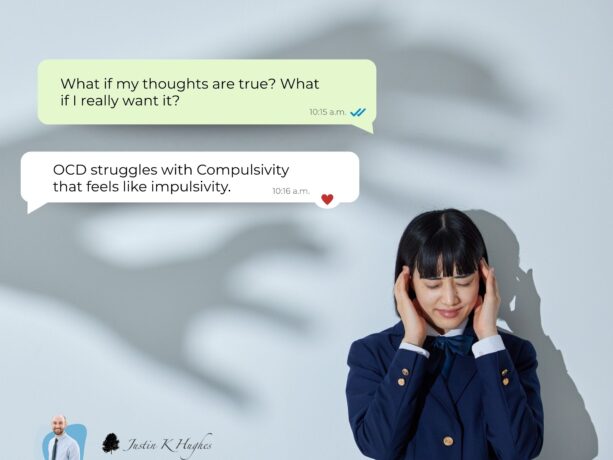
The unforgivable/unpardonable sin (also called the eternal sin or blasphemy against the Holy Spirit) can induce some level of fear for even the most convinced of Christians. To the person who gets stuck on the concept, such as in OCD, Generalized Anxiety, and/or scrupulosity, misery would not be too strong of a word to describe it. Personally, I suffered for several years in my childhood and for passing days in my adulthood with questioning my salvation- so I understand a lot of this on a personal and professional level. So what exactly are we talking about when we say “the unforgivable sin?”
What is the Unforgivable Sin?
Can there be a sin so terrible, horrendous and vile that it leads straight to hell without the option to ask forgiveness? Can this sin be accidental? Is it stated verbally, or through one’s thoughts, or confirmed by actions? Here are the 3 occurrences found in the Synoptic Gospels (Matthew, Mark, and Luke), describing the unforgivable sin:
- “Therefore I tell you, every sin and blasphemy will be forgiven people, but the blasphemy against the Spirit will not be forgiven. And whoever speaks a word against the Son of Man will be forgiven, but whoever speaks against the Holy Spirit will not be forgiven, either in this age or in the age to come” (Matt 12:31–32).
- “Truly, I say to you, all sins will be forgiven the children of man, and whatever blasphemies they utter, but whoever blasphemes against the Holy Spirit never has forgiveness, but is guilty of an eternal sin” (Mark 3:28–29).
- “And everyone who speaks a word against the Son of Man will be forgiven, but the one who blasphemes against the Holy Spirit will not be forgiven” (Luke 12:10).
What does it mean? I would like to offer you a simple explanation and definition that alleviates all fears. But I can’t, literally- I don’t have it. That would be pretty arrogant of me if revered church theologians since the time of Christ still lack a simple explanation. If you’re a super nerd like me, you may find it interesting to know that Martin Luther, John Chrysostom, St. Augustine, John Wesley, Jonathan Edwards, John Calvin (lots of guys named John, right?), and more have all had slightly different takes.
Summarizing 4 key perspectives on what the unforgivable sin is:
- Committing a terrible sin
- Stating falsehoods about the Holy Spirit
- Linking actual miracles done by the Spirit to Satan
- “Decisively reject[ing] clear truth the Spirit revealed about Jesus by attributing his mighty works to Satan.”
Context of the unforgivable sin.
For the sake of brevity and the fact that there are a wealth of commentaries and studies that explore this topic, let me just say that we must look at the whole of Scriptures if we are to take Scripture seriously. A major problem in modern day interpretation lies in “sound bites” and quick references that disregard context. Rule #1: know your context. Context is something you will be unable to get or see if you are LOCKED up in fear. Fear narrows focus. Its purpose, when functional, is to place our focus to a pinpoint so we can appropriately respond. If you have a disorder involving fear, you likely get stuck on a whole host of topics (or one major one) that requires re-learning that those without disorders take for granted.
For those of you looking simply for more knowledge on defining the topic, feel free to check out the great resources I’ve provided at the end to dig into the Scripture passages above, look at original languages and the context, audience of the passage, and so forth.
A remarkable reality is that there is no example in all of Scripture wherein a person who asks God’s forgiveness doesn’t receive it (which is a large support as to the views espoused in the resources, namely that blasphemy of the Holy Spirit must be a person who has decisively turned against God and rejects the opportunity to be forgiven). There are of course temporary consequences to sin and poor decisions (e.g., Moses not getting to see the Promised Land, David losing a child, Martha missing out on Jesus’ presence, Peter feeling intense feelings and shame about denying Christ, etc.).
“All that the Father gives me will come to me, and whoever comes to me I will never cast out” (John 6:37).
Hope.
If you suffer with the thought of the unforgivable sin and scrupulosity (like many saints throughout history), you’ll need different tools to respond- rather than living in fear. 4 suggestions:
- With the help of someone you trust in your faith community, identify a simple definition that you can live by, the same definition most people in your community live by. You’ll have to learn to lean into uncertainty. I know, it’s hard. It may feel impossible.
- Ask God for His help, but limit this prayer in a way that doesn’t let you ritualize or get stuck.
- Consider a therapist who is specialized or someone who can help you separate out obsessive fear and compulsions that do more harm than help.
- Once you identify unhelpful behaviors and thought processes, you will need to have powerful enough tools to implement different strategies for approaching this topic. Many clergy throughout history have done incredible with this; many have not. Your therapist needs to respect that you actually value this topic and not flippantly dismiss your faith.
Many of you have come to this article to get “the answer” (to feel “just right” or get reassurance). The harder and necessary task of faith may be to discover how to not obsess or feed your fear (which is not God’s desire for you, see “Fear Not“). If you came here today with a lack of information, then by all means go to the links below explaining some perspectives on what the unforgivable sin is. But if you’re like me at times in my life, or like the clients I see daily in therapy who can get stuck on verses like these, I prayerfully ask that our Lord would grant you strength to sit with difficult Bible passages without reacting out of fear- whatever that looks like today for you, my friend.
For more information:
R.C. Sproul: https://www.ligonier.org/blog/what-unpardonable-sin/
John Piper: https://www.desiringgod.org/articles/what-is-the-unforgivable-sin
David Jeremiah: https://www.crosswalk.com/slideshows/10-things-you-need-to-know-unforgivable-sin.html








Blasphemy against the holy spirit is not just spitting out blasphemies! It is a final rejection of christ and the testamony of the holy spirit who points at christ the saviour of all sins. It is not god who suddenly stops forgiving. It is we people who rejects the forgiveness offered by god through christ.
Thank you for sharing Lars.
A simple answer: Why blasphemy against the holy spirit can’t be forgiven is because it is never repented of. It is not just speaking blasphemious words it is a standpoint against god.God is not the problem, for god alls sins are forgivable, it is we people who rejects the holy spirit’s testimony who christ is,the saviour of all sins, and this leads to a hardened heart and a final rejection of christ and his Kingdom of forgiveness and eternal life. And a rejection of christ is to say no! To forgiveness. That is the simple answer. I hope despite my bad english this is understood! I have studied this bible problem for years. And if there is somebody who is worried about this sin the answer is: as long as there is repentance there is forgiveness, because the holy spirit is the one who leads us to repentance. John 6:37,1 John 1:9,1:7. Lars
Thanks for detail as to your Scripture study on this topic.